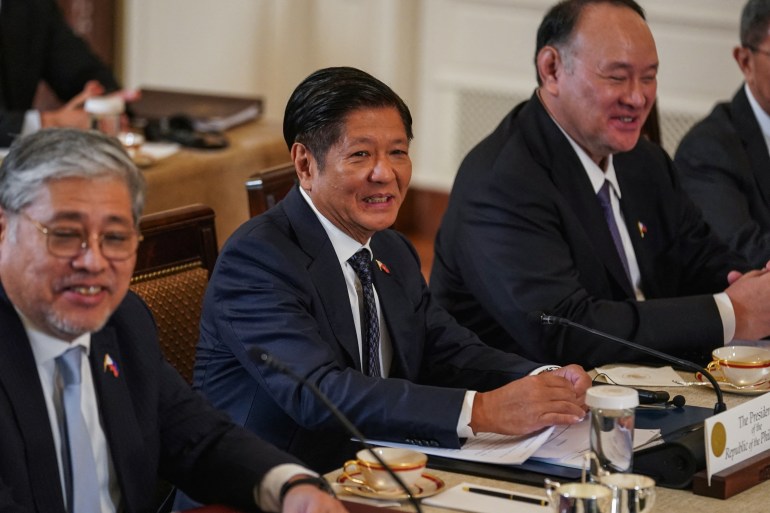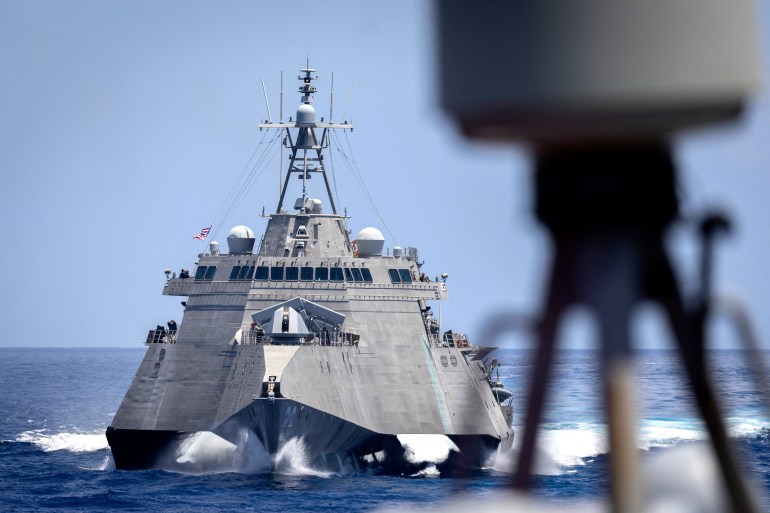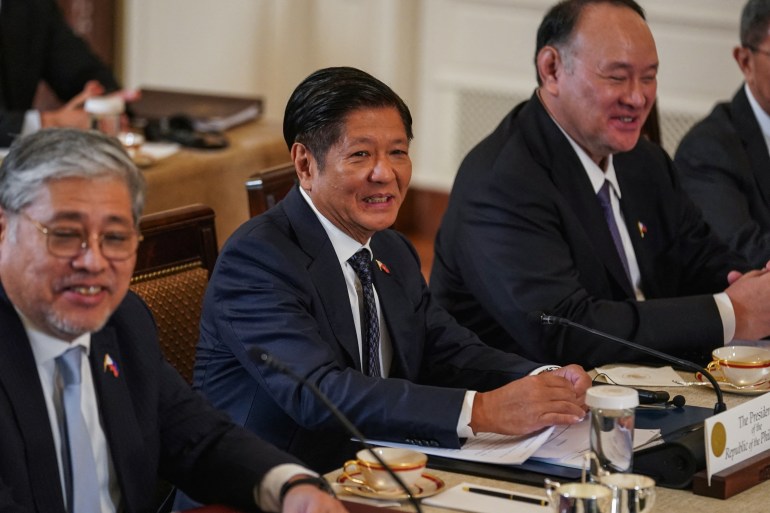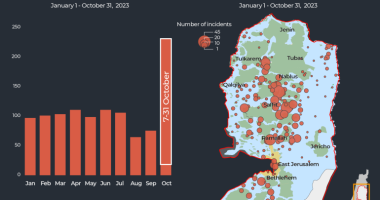Manila, Philippines – Against a backdrop of rising tension in the South China Sea between Beijing and Manila, the leaders of Japan, the Philippines and the United States have forged an unprecedented level of cooperation to counter China.
But while US President Joe Biden and Japan’s Prime Minister Fumio Kishida have stressed the security aspects of their cooperation, Philippine President Ferdinand Marcos Jr has highlighted its potential economic rewards, touting the partnership with promised investments of some $100bn as a friendship with benefits.
At the televised opening of the summit on April 11, Biden told the other two leaders: “I want to be clear. The United States’ defence commitments to Japan and the Philippines are ironclad. Any attack on Philippine aircraft, vessels or armed forces in the South China Sea will invoke our Mutual Defence Treaty.”
Only afterwards did Biden discuss how the US government would help the Philippines develop key economic areas such as its semiconductor supply chain, and telecommunications and critical infrastructure including ports, railways and agriculture.
In Manila, though, the Presidential Communications Office downplayed the security aspect of the concluded summit, which had expressed “serious concerns about the People’s Republic of China’s (PRC) dangerous and aggressive behaviour in the South China Sea”.
Instead, its news releases dwelt on US and Japan’s expressions of a “strong commitment of support for the economic prosperity of the Philippines”.
Financial analysts told Al Jazeera that while Washington has intertwined its promised economic development with Manila’s security commitments, Manila had chosen to highlight the economic gains to mask a sobering reality – that the country could be dragged into a military conflict with China.
“Marcos needs to sell [this] to Filipinos,” financial analyst Jonathan Ravelas told Al Jazeera on Friday.
“This is bitter medicine but I’m sugarcoating it, so it’s easily digestible,” Ravelas explained of the president’s approach.

Besides, if he focused on the security angle, “he might p*** off China,” added the managing director of e-Management for business and marketing services and retired chief market strategist of the Philippines’ largest bank, BDO.
Semiconductor push
Ravelas argues that Marcos Jr, like previous presidents, is keen to turn the country into a manufacturing and logistics hub. “We are geographically located to be part of the supply chain in ASEAN,” being within only three hours by air from regional countries Thailand, Singapore and Malaysia, he noted.
The summit announced the formation of the first-ever Partnership for Global Infrastructure and Investment corridor in the Asia Pacific, called the Luzon Economic Corridor. It will connect Manila to three sprawling areas in the country’s biggest island, Luzon, which can host manufacturers and other large business ventures: the US’s former Subic naval base, the former Clark airbase and Batangas province.
Ravelas noted that US semiconductor manufacturers were looking to diversify their locations and the young workforce made the Philippines a viable alternative.
The US, noted political economist Sonny Africa, has a military agenda and an economic agenda. “In both, the Philippines apparently plays an important part,” Africa, executive director of the socioeconomic think tank, Ibon Foundation, told Al Jazeera.
“Presumably, the alliance will be played up to have both security benefits and economic benefits. While it’s somewhat clear that the country plays a role in security-related moves against China, we feel the alliance is also serious in exploring the Philippines’ role in, for instance, being a location for segments of the semiconductor production, but also as a source of nickel which is essential for so much renewable energy technology. This is the direction of the US to attain domestic energy security,” he said.
On the home front, “the economic benefits will be played up to sweeten deepening Philippine entanglement in the US’s militarist agenda, especially versus China,” he said.
Still, he recognised that the economic aspects of the agreement were not merely “token sugarcoating” but also part of Washington’s “core agenda”.
“[The] US is genuinely out to build semiconductor production chains that are less China and Taiwan-centric and hence, less vulnerable and more resilient (to) conflict-related or other disruptions,” he said. “Similarly, the Philippines has among (the) world’s biggest reserves of nickel which is a critical element in batteries and other renewable technologies.”
Both countries are betting heavily on the Philippines to protect their business interests, amid rising regional tensions over the disputed South China Sea, a key international shipping route.
“Keeping the freedom of navigation will continue to allow the ease of trade not just in our region but globally,” said Ron Acoba, the chief investment strategist and co-founder of Trading Edge, a third-party research provider for local banks and brokerage firms.
The Philippines sits in a strategic position in the South China Sea which “functions as the throat of the Western Pacific and Indian oceans,” according to the Institute for Maritime and Ocean Affairs, a private research think tank in Manila.
China claims sovereignty over nearly all of the South China Sea through which “more than half of the world’s annual merchant fleet tonnage passes through these choke points, and a third of all maritime traffic worldwide,” according to the the institute.
It calculates about two-thirds of South Korea’s energy supplies, nearly 60 percent of Japan’s and Taiwan’s energy supplies, and 80 percent of China’s crude oil imports travel through the waters that are also claimed in part by the Philippines, Brunei, Malaysia and Vietnam.
China’s claim to the sea, based on the nine-dash line that was rejected by an international court in 2016, extends over large swaths of the Philippines’ exclusive economic zone (EEZ), including fishing grounds and potentially vast reserves of oil and gas deposits.
China has blocked all attempts by Manila to exploit the reserves. Under international law, an EEZ extends for 200 nautical miles (370km) beyond a country’s territorial sea and affords them jurisdictional rights over all natural resources.
“Politically speaking, it is correct to highlight the economic significance of the trilateral summit among the US, Japan and the Philippines,” Acoba said.
“But if you ask me, the main agenda really is to send a ‘message’’ to China, that the country is keen in upholding our rights. And that contrary to the prior administration, we are going in the direction of not just upholding but even enforcing our rights.”
Changing dynamic
For Harry Roque, the former spokesman for Marcos Jr’s predecessor Rodrigo Duterte, the pivot back to the US is a big mistake.
He blamed the about-turn for a drop in investments from China.
China’s foreign investments of nearly $20bn rose 37 percent in Asia in 2023 – with half of it going to Southeast Asia – but a report last month in the Japanese media outlet Nikkei said that the Philippines saw no new investment or construction projects at all from China.
The decline came even though Marcos Jr had visited Beijing in January 2023 and the presidential palace claimed he had secured “investment pledges” of $22.8bn.
“Of course, each president to his own,” Roque told Al Jazeera. “If the president wants this kind of policy, this is the kind of relations we have with China. But overall the policy of President Duterte was, let’s move forward on matters that we could on trade and investment and set aside matters that we could not resolve in this lifetime.
“No Chinese (businessman) will invest now because I know for a fact that many Chinese who intend to invest have put it aside already because they fear that their investments might be confiscated given the hostile environment,” he said.
“So no one from China will touch the Philippines as far as capital is concerned,” he said.

After the Washington, DC summit, Marcos Jr said he was confident that the deals with the US and Japan would not undermine Chinese investment.
The three leaders had earlier expressed “serious concerns about the People’s Republic of China’s (PRC) dangerous and aggressive behavior in the South China Sea”, and Marcos Jr stressed the trilateral relationships would “change the dynamic” in Southeast Asia and the South China Sea.
Still, he sought to reassure Beijing, saying the action was “not against any country”.
After a series of confrontations with the Chinese coastguard, mostly around the disputed Second Thomas Shoal, it seems most Filipinos agree that it is time for the Philippines to assert its maritime rights with the help of the US and Japan.
The shoal, where the Philippines grounded the naval ship Sierra Madre in 1999, lies about 200km (124 miles) from the Philippine island of Palawan and more than 1,000km (620 miles) from China’s nearest major landmass, Hainan island.
Private pollster Pulse Asia revealed that in a December 2023 survey of 1,200 respondents, 79 percent wanted Marcos to work with the US to deter Chinese aggression in the South China Sea.
Only 10 percent wanted his government to work with China to resolve the tension.
Read More: World News | Entertainment News | Celeb News
Aljazera








